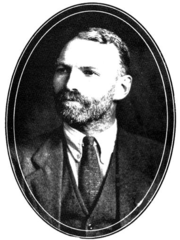William X. O'Brien
- William X. O'Brien (ITGWU) and William O'Brien (Home Rule/IPP) were contemporaries in Irish politics early in the 20th century, but should not be confused. For other people of the same name see William O'Brien (disambiguation).
| William X. O'Brien | |
|---|---|
 | |
| Teachta Dála | |
|
In office July 1937 – May 1938 | |
|
In office June 1927 – August 1927 | |
| Constituency | Tipperary |
|
In office June 1922 – August 1923 | |
| Constituency | Dublin South |
| Personal details | |
| Born |
23 January 1881 Clonakilty, Ireland |
| Died | 31 October 1968 (aged 87) |
| Nationality | Irish |
| Political party |
National Labour Party (1944–46) Labour Party (1912–44) |
| Occupation | Trade union leader |
William X. O'Brien (23 January 1881 – 31 October 1968) was a politician and trade unionist in Ireland.[1]
Born in Clonakilty, County Cork, and christened 'John William',[2] O'Brien moved with his family to Dublin in 1897, and quickly became involved in the Irish Socialist Republican Party (ISRP).[3] O'Brien is described as "a very significant figure in the ISRP" by the historian of the ISRP, David Lynch.[4]
A close friend and associate of James Connolly,[3] O'Brien helped establish the Irish Transport and General Workers' Union in 1909, and was instrumental in the Dublin Lock-out strike in 1913.[5]
A member of the Irish Neutrality League, and Anti-Conscription Committee, during the World War I, O'Brien was interned on several occasions by the Dublin Castle government.[6] During one of these instances, he stood in the 1920 Stockport by-election, but was refused a release to campaign in it.
With the formation of the Irish Free State, O'Brien was elected as Teachta Dála (TD) for Dublin South at the 1922 general election, and again for Tipperary in June 1927 and again in 1937.[7]
An important figure in the Labour Party in Ireland in its formative days, O'Brien resisted James Larkin's attempt to gain control of the Party on release from prison. Taking Larkin to court over his occupation of ITGWU headquarters, the Larkin-O'Brien feud resulted in a split within the labour and trade union movements, and the formation of the Irish Congress of Trade Unions.[8]
In 1930, O'Brien sought to have Leon Trotsky granted asylum in Ireland, but the head of the Free State government, W. T. Cosgrave, refused to allow it.[9]
Active in politics and the trade union movement into his 60s, O'Brien retired in 1946 and died on 31 October 1968.
References
- ↑ "Mr. William O'Brien". Oireachtas Members Database. Retrieved 16 April 2012.
- ↑ William O'Brien 1881-1968: Socialist, Republican, Dáil Deputy, Editor, and Trade Union Leader, Thomas J. Morrissey, Four Courts Press, 2007, pg 1
- 1 2 Morrissey SJ, Thomas J. (2007). William O'Brien, 1881–1968 - Socialist, republican, Dáil deputy, editor and trade union leader. Four Courts Press. ISBN 978-1-84682-067-0.
- ↑ Lynch, David (2005). Radical Politics in Modern Ireland A History of the Irish Socialist Republican Party 1896-1904. Irish Academic Press Ltd. p. 21. ISBN 978-0-7165-3356-6.
- ↑ Yeates, Padraig (2001). Lockout: Dublin 1913. Macmillan. ISBN 0-312-23890-8.
- ↑ The Irish Citizen Army - history
- ↑ "William O'Brien". ElectionsIreland.org. Retrieved 16 April 2012.
- ↑ SIPTU.ie - History, An Overview
- ↑ Keogh, Dermot (1998). Jews in Twentieth-century Ireland: Refugees, Anti-semitism and the Holocaust. Cork University Press. ISBN 978-1-85918-150-8.
| Political offices | ||
|---|---|---|
| Preceded by Michael O'Lehane |
President of the Irish Trade Union Congress 1913 |
Succeeded by James Larkin |
| Preceded by Thomas MacPartlin |
President of the Dublin Trades Council 1914 |
Succeeded by Thomas Farren |
| Preceded by John Simmons |
Secretary of the Dublin Trades Council 1913–1918 |
Succeeded by Thomas Farren |
| Preceded by Thomas MacPartlin |
President of the Irish Trade Union Congress 1918 |
Succeeded by Thomas Cassidy |
| Preceded by P. T. Daly |
General Secretary of the Irish Trade Union Congress 1918–1920 |
Succeeded by Thomas Johnson |
| Preceded by Thomas Johnson |
Treasurer of the Irish Trade Union Congress 1921–1924 |
Succeeded by Archie Heron |
| Preceded by James Larkin |
General Secretary of the Irish Transport and General Workers' Union 1924–1946 |
Succeeded by Tom Kennedy? |
| Preceded by Luke Duffy |
President of the Irish Trade Union Congress 1925 |
Succeeded by Denis Cullen |
| Preceded by Archie Heron |
Treasurer of the Irish Trade Union Congress 1926–1929 |
Succeeded by Denis Cullen |
| Preceded by Sam Kyle |
President of the Irish Trade Union Congress 1941 |
Succeeded by Michael Colgan |